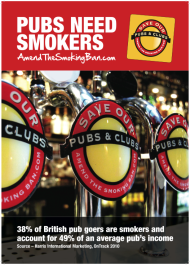EU couldn't make it up
 Thursday, March 20, 2008
Thursday, March 20, 2008 Hilarious! That's the only word for it (although I can think of a few others). I don't, as a rule, use this blog to report private meetings and conversations, but here's what happened when I attended yesterday's meeting (in Brussels) of "EU experts, civil society and social partners to support the Commission's Impact Assessment on the forthcoming initiative on smoke-free environments":
I sensed, as soon as I entered the room and introduced myself ("Hello, I'm Simon Clark - from the smokers' lobby group Forest"), that there could be trouble. The guy from Pfizer (yes, the pharmaceutical company) didn't look pleased, and there were mutterings from some of the other delegates. (There were around 20 in all.)
No surprise then, when, as soon as the meeting began, and we had all formally identified ourselves, two or three hands shot up. As I suspected, some of my fellow delegates were none too happy that a representative of Forest was in the room. If I didn't leave, said one, she would. Others nodded their heads in agreement.
The facilitator (chairwoman) looked at me. "Sorry," I said, "I'm not trying to be difficult because I know some of you have come a long way for this meeting, but Forest represents adults who choose to smoke and tolerant non-smokers like me. The consumer is entitled to be represented in the political process. So, on a point of principle, I'm not going to leave."
And that was how it stood until the facilitator suggested a compromise - of sorts. I could stay for the presentation and return to have my say at the end of the meeting. For the duration of the "facilitated discussion", however, I would have to leave the room. (For some reason the other delegates didn't want me to hear what they had to say. So much for transparent, open government! What do these people have to hide?)
I agreed. I suppose I could have stood my ground and refused to go, but to what purpose? The meeting would have broken up and they would have reconvened at a later date in my absence. In this situation it's best to make your point and leave them to it.
Anyway, the principal reason I was there was not to hear what they had to say (interesting though it may have been) but to communicate Forest's position. And that, in the end, is what I was able to do - helped, I have to say, by the facilitator who, faced with a tricky situation, did her best to keep all parties (including me) happy.
And so, at the end of the meeting, after the other delegates had left, I was invited back in and given 15 minutes to answer questions and make our views abundantly clear. Amusingly, even this session didn't go entirely smoothly. At one point, having pointed out the flaws in the "evidence" on passive smoking, I was asked to apologise (seriously!) by a woman who said she was an epidemiologist with a degree at Harvard. (So what? as Ed Balls might say.) Apparently my comments had upset her, poor soul. (Don't worry, I didn't apologise.)
Needless to say there was no written list of participants (I wonder why not?!), so I had to make my own. Make of it what you will, but the companies and organisations present (or invited) included:
Pfizer, Novartis, Johnson & Johnson, GlaxoSmithKline (all pharmaceutical companies), Eurofound (European Foundation for the Improvement of Living and Working Conditions), InwatEurope (International Network of Women against Tobacco), International Health and Social Affairs Office, NHS Health Scotland, Business Europe, EUN, HOTREC (representing hotels, restaurants and cafes in Europe), AESGP (Association of the European Self-Medication Industry), SFP (Smoke-Free Partnership) and EHN (European Heart Network).
Disappointingly, but not surprisingly, even the hospitality guy failed to support my presence at the meeting so I tackled him afterwards. We represent your customers, I said. Why didn't you say something? "I felt uncomfortable but it wasn't my meeting," he bleated. Pathetic. Sometimes, I told him, you have to have the courage to stand up and be counted. Hospitality? With "friends" like that who needs enemies.
 Simon Clark
Simon Clark
Britain's premier political blogger Iain Dale has added this comment HERE. Pass it on.
 Smoking Ban
Smoking Ban 








